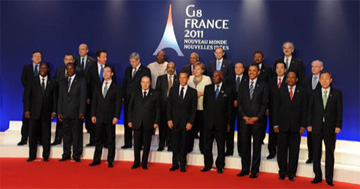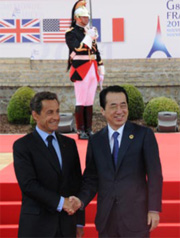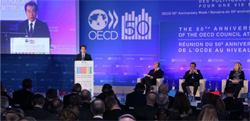Home > Highlighting JAPAN > Highlighting Japan JUNE 2011 > G8 Deauville Summit
Highlighting JAPAN
PRIME MINISTER'S DIARY
G8 Deauville Summit

World leaders attend the photo call before the G8 Deauville Summit.
At the start of the meeting, President Sarkozy expressed his solidarity with and support for the Japanese people in the aftermath of the Great East Japan Earthquake. On the topic of nuclear safety, Prime Minister Kan stated that Japan would aim to establish the world's highest levels of nuclear safety while thoroughly investigating the causes of the nuclear accident. He also said that Japan would share the information and lessons learned with the international community and lead international discussion on the topic.
On the nuclear accident, the Prime Minister explained that with the cooperation of the international community, Japan is working to settle the situation and stabilize the nuclear reactors. He thanked France for the support given related to the clean up of highly irradiated water.

President Nicolas Sarkozy of France and Prime Minister Naoto Kan of Japan shake hands before the G8 Deauville Summit.
The first challenge, he said, is the safety of nuclear energy, and to achieve the highest standard of nuclear safety by drawing on the lessons from the nuclear accidents. The second is the environmental challenge of fossil fuels, which is to promote the efficient use of fossil fuels and minimize the emission of carbon dioxide (CO2) to the limit by drawing on the most advanced technologies. The third challenge concerns the practical use of renewable energy, which is to mobilize all of Japan's resources to break the barrier to practical use due to such aspects as technology and costs, and will elevate renewable energy to one of society's core energy sources. The fourth challenge is the potential of energy efficiency, which is to achieve energy efficiency without compromising the comfort of life in households and communities.
Prime Minister Kan stated, "In Japan there is an old dictum, 'Learn to be contented.' What this dictum teaches us is not to endlessly increase our own desire, but to learn where an appropriate level is.

Prime Minister Kan delivers his address at the 50th Anniversary Meeting of the OECD
G8 Summit
Prime Minister Naoto Kan attended the Deauville G8 Summit on May 26 and 27. In his remarks at the beginning of the Summit, he expressed his gratitude for the assistance and friendship from around the world as well as explaining that Japan would do its utmost to bring the nuclear accident under control and achieve recovery. The prime minister also laid out the four challenges that he unveiled the previous day at the OECD. In response, the other leaders renewed their heartfelt sympathy to and solidarity with Japan, paying tribute to the courage and dignity shown by Japanese people amid the difficult situation.
In addition, Prime Minister Kan stated that Japan would fulfill its responsibility by sharing the experiences and lessons learned from the nuclear accident and explained that he has launched the Accident Investigation and Verification Committee to promote the highest levels of nuclear safety worldwide. He also announced an initiative to host an international meeting on nuclear safety in Japan in the latter half of 2012 in cooperation with the IAEA.
The leaders discussed wide-ranging issues regarding the current world situations. Prime Minister Kan led the discussion on North Korea, and the G8 leaders jointly sent a strong message against North Korea.
With regard to the Middle East and North Africa, Prime Minister Kan expressed Japan's intention to contribute to assistance for the region, focusing on (a) fair political process and government, (b) human resource development, and (c) job creation and fostering of industries. At the dialogue with African leaders, Prime Minister Kan expressed Japan's resolve to continue to contribute to African development by implementing the comprehensive pledges it made at the 4th Tokyo International Conference on African Development (TICAD IV).
© 2009 Cabinet Office, Government of Japan






